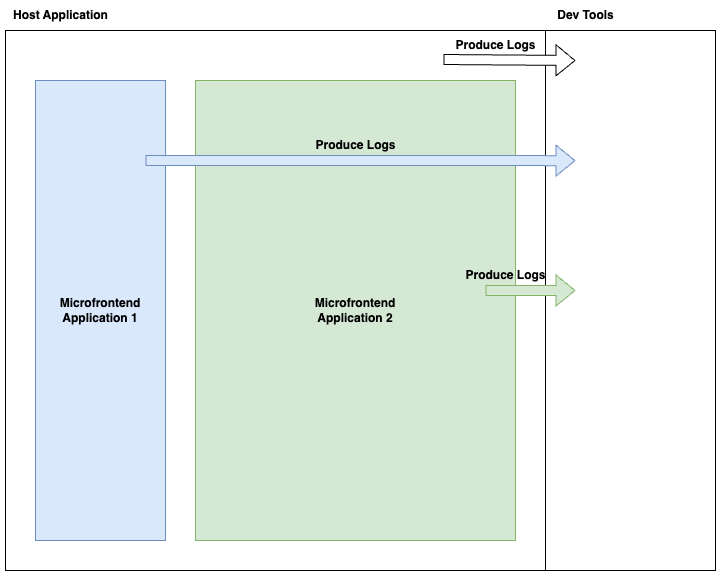Global Store
The Global Store is a global cache and control hub for your Adze logs. The primary purposes of a GlobalStore are to enable global configuration overrides, log listeners, and tools for filtering and recalling your cached logs. To see how a GlobalStore fits into the architecture, refer to the Lifecycle Diagram.
How Does It Work?
One of the primary purposes of the Global Store is to enable large project to centrally control how their logs render. Let's imagine we have a micro-frontend architecture where we have multiple front-end applications running in the same browser context.

One of the major challenges with logging with microfrontends is that all of the applications share the same runtime environment. This means that any logs that an application generates are mixed in with logs generated by any of the other applications.
Debugging one of these apps would mean we would have to sort through a lot of logs that are not applicable. In addition, there would normally be no easy way to configure the logging of these applications centrally.
With the Adze Global Store you can easily configure all instances running in the same browser context. Let's take a look at some code:
import adze from 'adze';
adze.log('This is a log!');
This code looks pretty simple. We're just importing Adze and generating a single log. However, behind the scenes, Adze will check if a Global Store exists, and if it doesn't exist it will automatically instantiate an instance of it in the global context of your environment.
Here's where it will be created:
window.$adzeGlobal- If your environment is a web browser / deno, the Global Store will be attached to thewindow.global.$adzeGlobal- If your environment is node / bun, the Global Store will be attached to theglobalvalue.
The logs that are generated within your runtime context will take any configuration that is set on the Global Store and merge it on top of its current configuration as an override.
What this means is that even if multiple applications generate logs, you can control all of the logs by providing configuration to the Global Store.
Using the Setup Function
Let's look at an example of overriding log configuration centrally using the Global Store with the setup() function.
import adze, { setup } from 'adze';
// By calling setup, we will instantiate the global store with some configuration overrides.
// We will restrict the active log level to info for everything in our runtime context.
setup({
activeLevel: 'info',
format: 'pretty',
});
Meanwhile... in microfrontend application #1...
// mfe-application-1.ts
import adze from 'adze';
const logger = adze.format('json').ns('application-1').seal();
logger.info('Welcome to Application #1!');
logger.log('Something happened that I want to log about.', 123);
logger.debug('Some more details here...', { foo: 'bar' });
And in microfrontend application #2...
// mfe-application-2.ts
import adze from 'adze';
const logger = adze.format('json').ns('application-2').seal();
logger.info('Welcome to Application #2!');
logger.error('Oh no! An error occurred in application #2!');
logger.debug('Logging some more details for debugging purposes.', { foo: 'bar' });
Browser Output

Server Output

Notice that in our example output that the log and debug logs are not rendering. This is because our store is forcing their log level to only show up to info level. Also, even though each application is defining the log format to use the json format, the logs are printing with the pretty format because the log configuration is overwritten by the global configuration.